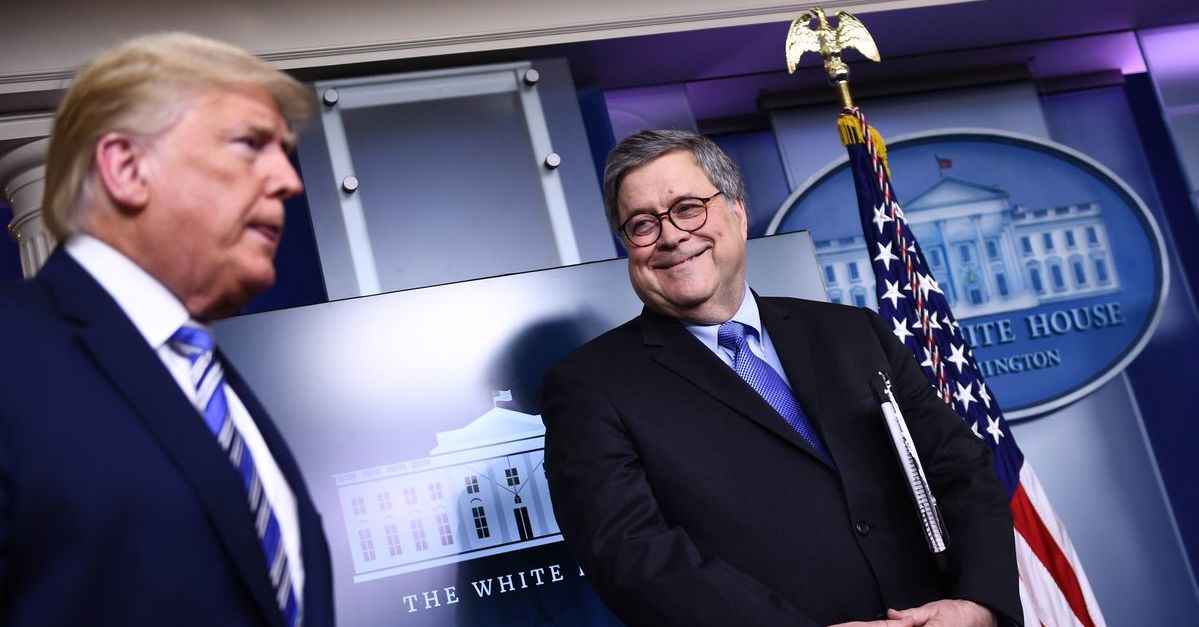
The U.S. Department of Justice (DOJ) has cleared the field for a drug wholesaler to distribute the anti-malarial drug hydroxychloroquine without running afoul of federal antitrust laws.
The DOJ’s preferential treatment for Pennsylvania-based AmerisourceBergen Corporation is a clear sign of deference from Attorney General Bill Barr to President Donald Trump’s hype without proof of the drug as an effective treatment for COVID-19.
The drug wholesaler recently wrote to DOJ in an effort to ascertain what, if any, antitrust enforcement intentions the agency was considering in regard to the company’s “efforts to identify global supply opportunities, ensure product quality, and facilitate product distribution to the most imperiled communities of medications and other healthcare supplies to treat COVID-19 patients.”
Under the Business Review Procedure, companies concerned about the legality of potential business activity under antitrust laws can effectively ask the DOJ if they intend to exact regulatory oversight and, if so, the extent of such oversight or law enforcement actions.
Monday’s letter by Assistant Attorney General Makan Delrahim alerted AmerisourceBergen Corporation that their proposal to move forward with distributing hydroxychloroquine for COVID-19-related illness would pose no regulatory issue at the present time.
Relying “on the information and representations” provided to the DOJ’s Antitrust Division by the company, the agency affirmed in their business review letter that it “does not intend to challenge AmerisourceBergen’s efforts to identify global supply opportunities, ensure product quality, and facilitate product distribution of medications and other healthcare supplies.”
The specific business activity is noted in the letter, at length:
One initiative is the distribution of hydroxychloroquine from the Stockpile to health care providers in areas of greatest need. In this distribution initiative, AmerisourceBergen and other distributors act as the U.S. Government’s distribution agents. The U.S. Government will instruct AmerisourceBergen on the amount of hydroxychloroquine it will receive and where the hydroxychloroquine is to be sent. The U.S. Government does not inform AmerisourceBergen of its instructions to other distributors. The hydroxychloroquine is donated, meaning the U.S. Government does not charge AmerisourceBergen or other distributors for it. Further, AmerisourceBergen does not charge the U.S. Government for its distribution services, nor does AmerisourceBergen charge the health care providers for the medicines that they receive. Recognizing the extreme urgency of getting medicines to areas of greatest need, AmerisourceBergen, along with other distributors, are serving as the U.S. Government’s distributors while concurrently seeking to memorialize their role in a written agreement.
The reason AmerisourceBergen’s proposed business activity might otherwise run afoul of antitrust laws, however, is because the company says it will have to collaborate with other companies–including competitors–by sharing and seeking sensitive information.
In theory, the information is supposed to be shared “bilaterally” between requesting government agencies in order to facilitate the hydroxychloroquine scheme and not between different drug companies themselves. But the agreement also notes that occasional deviations from this conduct are likely and gives DOJ’s approval for when such deviations inevitably occur.
The business review letter openly admits:
Although AmerisourceBergen has represented that the Proposed Conduct will be“[a]t the direction of FEMA, HHS, and other government agencies,” it acknowledges that discussions outside of FEMA’s presence may be necessary given “the fast-moving nature of the COVID-19 crisis.” The scope of this business review letter will therefore encompass activities necessary to carry out directions from FEMA, HHS, or another U.S.Government agency, even if they occur outside the presence of those agencies.
And, the DOJ notes, otherwise anti-competitive behavior like that is possibly a good thing under the circumstances–calling the benefits amidst the current pandemic “unusually strong.”
“Upon resolution of the COVID-19-related disruptions and the disbanding of the related U.S. Government response initiatives, AmerisourceBergen and other distributors will formally dissolve their competitor collaboration,” the letter states.
DOJ also explains that they are essentially taking AmerisourceBergen’s word for the pro-competitive nature of the proposal because similar “legitimate collaborations” have worked with similar safeguards in response to the COVID-19 pandemic.
“Based on these representations and given the current circumstances, the pro-competitive benefits of the Proposed Conduct appear to far outweigh any potential harm,” the letter reads. “Even so, the [DOJ] would be concerned if AmerisourceBergen used this collaboration to engage in prohibited conduct ‘such as unlawful price fixing or directly exchanging sensitive forward-looking competitive information.’ The Department has not seen any evidence, however, that this is likely to occur. Indeed, given the unique facts and circumstances here, such harm seems unlikely.”
That’s likely to be seen as a controversial interpretation of recent history.
In early 2019, accusations swirled that AmerisourceBergen played a key role in what 44 state attorneys general referred to as “possibly the largest cartel case in the history of the United States.”
The wide latitude being granted to the company is also sure to be seen in a critical light due to the unproven and dangerous nature of the drug at the forefront of the proposal for DOJ’s one-year pause in antitrust enforcement here.
The scientific publication which published the initial study on the efficacy of hydroxychloroquine in treating Coronavirus patients has consequently reversed its endorsement of those findings–saying the original article did “not meet” the “expected standard” in the relevant field or methodology, especially with regard to “patient safety.”
There is currently no treatment approved by the U.S. Food and Drug Administration for the treatment of COVID-19.
[image via BRENDAN SMIALOWSKI/AFP via Getty Images]